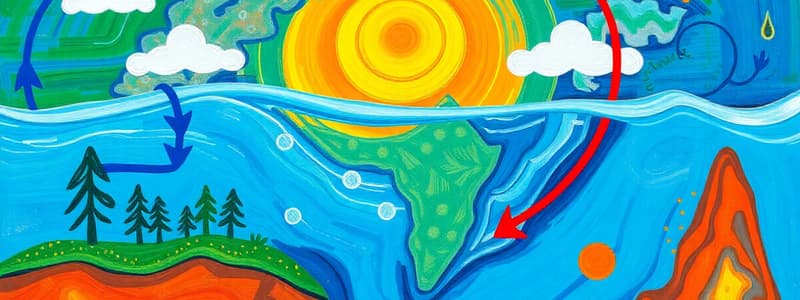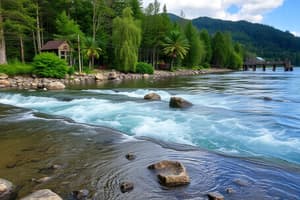Podcast
Questions and Answers
What is the primary characteristic of a closed system, specifically in relation to the global water cycle?
What is the primary characteristic of a closed system, specifically in relation to the global water cycle?
A closed system does not exchange matter with its surroundings, only energy.
What are the three main stores of water in the global system, and why is each important?
What are the three main stores of water in the global system, and why is each important?
The atmosphere, the cryosphere, and the hydrosphere; each stores water essential for different processes and ecosystems.
What is a watershed, and why is it significant to the concept of a drainage basin?
What is a watershed, and why is it significant to the concept of a drainage basin?
A watershed is the boundary of a drainage basin, significant because it defines the area that collects precipitation feeding into a water body.
Explain the difference between infiltration and percolation in the context of soil water movement.
Explain the difference between infiltration and percolation in the context of soil water movement.
How does urbanization contribute to changes in surface runoff within the drainage basin system?
How does urbanization contribute to changes in surface runoff within the drainage basin system?
What process describes the loss of water from plants, and why is it important for the water cycle?
What process describes the loss of water from plants, and why is it important for the water cycle?
What role does deforestation play in altering the natural water cycle?
What role does deforestation play in altering the natural water cycle?
Describe what happens during positive feedback in the context of melting ice.
Describe what happens during positive feedback in the context of melting ice.
What occurs during throughflow in the drainage basin system?
What occurs during throughflow in the drainage basin system?
Explain the concept of interception in relation to precipitation and vegetation.
Explain the concept of interception in relation to precipitation and vegetation.
Flashcards
System
System
A group of interconnected parts working together to achieve a common goal.
Drainage Basin
Drainage Basin
An area of land where water drains into a single river.
Watershed
Watershed
The boundary of a drainage basin.
Infiltration
Infiltration
Signup and view all the flashcards
Percolation
Percolation
Signup and view all the flashcards
Surface Runoff
Surface Runoff
Signup and view all the flashcards
Water Table
Water Table
Signup and view all the flashcards
Positive Feedback
Positive Feedback
Signup and view all the flashcards
Urbanization
Urbanization
Signup and view all the flashcards
Deforestation
Deforestation
Signup and view all the flashcards
Study Notes
The Global Water Cycle: A Systems Approach
-
System Definition: A system is a set of interconnected components working together.
-
Global Water Cycle Type: The global water cycle is a closed system.
-
Major Water Stores: The main stores of water include the atmosphere, cryosphere (ice and glaciers), and hydrosphere (oceans, lakes, rivers).
-
Largest Freshwater Store: The cryosphere (glaciers and ice caps) holds the largest amount of freshwater on Earth.
-
Drainage Basin: An area of land drained by a river and its tributaries.
-
Watershed: The boundary of a drainage basin.
-
Drainage Basin Inputs: Precipitation is the primary input to a drainage basin.
-
Drainage Basin Outputs: Evaporation, transpiration, and river discharge are key outputs.
-
Water Table: The upper level of saturated ground.
-
Infiltration: Water entering the soil.
-
Percolation: Water moving downward through soil layers.
-
Throughflow: Lateral water movement within the soil.
-
Groundwater Flow: Slow water movement through permeable rock.
-
Surface Runoff: Water flowing over the land surface.
-
Transpiration: Water loss from plants through leaf pores.
-
Evaporation vs. Evapotranspiration: Evaporation is water loss from surfaces; evapotranspiration includes plant water loss.
-
Interception: Water caught and held by vegetation.
-
Melting Ice Feedback: Melting ice triggering further melting is a positive feedback loop.
-
Human Impact: Deforestation alters the water cycle.
-
Urbanization Impact: Urbanization increases surface runoff and reduces infiltration.
Studying That Suits You
Use AI to generate personalized quizzes and flashcards to suit your learning preferences.
Description
Explore the intricate components of the global water cycle in this quiz. Learn about water stores, drainage basins, and the movement of water through various systems. Test your knowledge on how precipitation, evaporation, and other processes shape our planet's water resources.




